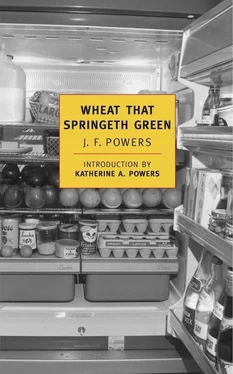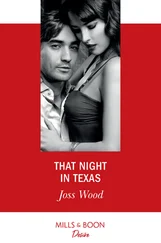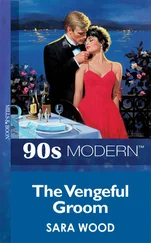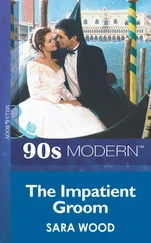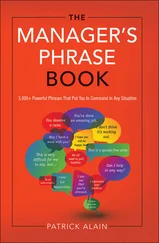J. Powers - Wheat That Springeth Green
Здесь есть возможность читать онлайн «J. Powers - Wheat That Springeth Green» весь текст электронной книги совершенно бесплатно (целиком полную версию без сокращений). В некоторых случаях можно слушать аудио, скачать через торрент в формате fb2 и присутствует краткое содержание. Год выпуска: 2000, Издательство: NYRB Classics, Жанр: Современная проза, на английском языке. Описание произведения, (предисловие) а так же отзывы посетителей доступны на портале библиотеки ЛибКат.
- Название:Wheat That Springeth Green
- Автор:
- Издательство:NYRB Classics
- Жанр:
- Год:2000
- ISBN:нет данных
- Рейтинг книги:5 / 5. Голосов: 1
-
Избранное:Добавить в избранное
- Отзывы:
-
Ваша оценка:
- 100
- 1
- 2
- 3
- 4
- 5
Wheat That Springeth Green: краткое содержание, описание и аннотация
Предлагаем к чтению аннотацию, описание, краткое содержание или предисловие (зависит от того, что написал сам автор книги «Wheat That Springeth Green»). Если вы не нашли необходимую информацию о книге — напишите в комментариях, мы постараемся отыскать её.
Wheat That Springeth Green — читать онлайн бесплатно полную книгу (весь текст) целиком
Ниже представлен текст книги, разбитый по страницам. Система сохранения места последней прочитанной страницы, позволяет с удобством читать онлайн бесплатно книгу «Wheat That Springeth Green», без необходимости каждый раз заново искать на чём Вы остановились. Поставьте закладку, и сможете в любой момент перейти на страницу, на которой закончили чтение.
Интервал:
Закладка:
“ Dora! ”
“Whut?”
“What you said !”
“Whut?”
“ Come! ”
At such times they’d laugh, and even when they were lying with their heads down and their bottoms up (how Joe most liked to see them), he’d gaze off in the distance as if not listening to the conversation — he didn’t know whether Frances thought he couldn’t understand it, didn’t care if he could, or was trying to embarrass him. Sometimes she’d suddenly look up at him and say: “ You still here?” Once she’d said, but hadn’t looked up at him, fortunately, because it had made him blush:
“Dora, what about this Peeping Tom here?”
“Whut? Who?”
“Joe. He drinks, you know. What if he came in drunk some night?”
“Whut? Where?”
“The road house.”
“Whut if he did? So whut?”
“ Dora! ”
“Whut? Not old enough to do business with?”
“Dora, he plans to enter the priesthood .”
“Do tell.”
“Maybe,” Joe said, “I’ll just enter the family business.”
“Anytime, kid,” Dora said.
And Frances laughed.
Until that summer, Joe had visited Hedblad’s only as a customer, in the Reo or the Pierce-Arrow, usually in the daytime, but late in June, still wearing his letterman’s sweater, he began what was now his routine in the evening (unless he drove out to the ball park in the Reo), dropping in at the station to talk sports with the night attendants. Dale, the younger one, had gone to Immaculata for a while, but wasn’t the kind of guy Joe had known, not an athlete and not much of anything else, just one of the guys you see around school and then don’t. Rock, over twenty-one, was from Chicago and thought he was so great — claimed that he’d once seen Ralph (not Al) Capone, whom he called Bottles, and that he’d lived near Wrigley Field, Home of the Cubs.
If Rock and Dale were busy, Joe was now trusted to answer the phone, to hand out road maps, to hose down the pavement, and the talk was now less of sports, more of cars and babes. Joe didn’t pretend to know much about cars, couldn’t say what the Reo or the Pierce would do if opened up, and wouldn’t have pretended to know much about babes if it hadn’t been thought (by Dale, not Rock) that he did because he was so blasé. (“You’re Blasé” was one of Joe’s favorite songs.) Dale, if not Rock, was impressed by the neighborhood Joe lived in, the clothes he wore, and probably by the way he’d casually pick up a dirty cartoon book and toss it aside unread, the way he’d casually point out that a car was waiting for service when the talk was about babes, and the way, recently, he’d casually bought (as if they were cigarettes) a pack of “cundrums” at the station. “Ever lose one on the job, Joe?” “Can’t say I have, Dale. You?” Blasé.
So if Joe asked for advice on how to do business with Dora, he had plenty to lose at the station, at least with Dale, who, though, was a very serious guy for a guy with nothing on his mind but cars and babes and wouldn’t laugh at him, as Rock would. But what if Joe asked for advice and Rock found out from Dale? Rock was a crude character. At first he’d called Joe Dash Man—“Hey, Dash Man!”—but now it was Gash Man. Joe, though embarrassed by this, was also flattered by it, as he wasn’t when Rock asked him how often he beat his meat, pulled his pud, or when Rock held his hand out limply, palm up, as though the fingers were broken, and whispered, “Smell my new babe,” which Rock had done nightly until Joe replied, “Sorry, Rock, I’ve got a cold.” Blasé.
Some of the things Joe heard at the station were hard for him to believe. It was a sure sign of recent sexual activity if a babe’s eyes were all black underneath, Dale said, and as often as not, after a babe whose tank he’d filled, oil he’d checked, windshield he’d cleaned, and eyes he’d inspected, drove away, he’d shake his head and say, “Goes another one,” drawing from Joe, at most, a nod. Blasé. According to Rock, when Mr Hedblad was there during the day, hot babes phoned the station, even in the summertime, to say they couldn’t get their car started— that was the code —and off Mr Hedblad (whom Rock called Horse Cock) would go in the wrecker. “You seen him in it, Joe.” “Oh, sure.” Blasé. It was hard for Joe to believe this of Mr Hedblad, an old bald-headed married guy who wore a black leather bow tie. But from other things Joe heard at the station and did not doubt, many more people than he’d imagined — not just young guys like himself, and certainly more babes — were having trouble with the Sixth Commandment.
It showed Joe what the world was like, what he’d be up against if he became a priest.
It also showed him he wasn’t so bad, made him feel better about himself, but not much.
He was what St Augustine (who’d asked God to make him chaste but not yet) had been before he straightened out — a vicious youth.
One night Joe promised God that if the uncensored poses came the next day he’d burn them sight unseen and go to confession (to the Italian church downtown), but they hadn’t come, fortunately.
So, early in August, in thought, word, and deed, Joe was still sinning away.
On the evenings he drove out to the ball park (the sign on the left-field fence now said HACKETT’S QUALITY COAL, nothing about hot stuff, or win a ton — Uncle Bobby was selling real estate in California), he sat alone in the family box and appeared to take a lively interest in the flight of foul balls over the grandstand, but was really looking up skirts.
Late at night, wearing only his pajama bottoms because of the heat, he lay in the dark, listening to his radio, to dance music emanating from Frank Dailey’s Meadowbrook, from the beautiful Glen Island Casino, the Aragon, the Trianon (“Lee Bennett steps forward to ask the musical question ‘Who?’”), the Cotton Club (“Duke Ellington and his famous orchestra continue the program with a number captioned ‘Caravan’”), but when the lights went on across the way, in Dora’s living quarters over the garage, he got up to use Mama’s opera glasses.
In the afternoon, leaning on the stone wall, he was still the friendly young neighbor with an erection, now waiting, however, for a chance to speak to one of the sunbathers alone, a chance that finally came.
“Dora.”
“Whut?”
“You know what you said.”
“Whut?”
“‘Anytime,’ you said.”
Silence.
“Dora.”
“Whut?”
“You know.”
Silence.
“Dora.”
“Cost ya, kid.”
“O.K.”
“Ten dollars.”
“O.K.”
“I mean twenty.”
“O.K.”
Silence.
“Dora.”
“Whut?”
“When?”
Silence.
“Tonight, Dora?”
“I don’t get off till nine-thirty.”
“That’s not late.”
“I might be real late if somebody gives me a ride.”
“I’ll give you a ride. I’ll pick you up in the Reo.”
“No, the big one.”
“O.K., the Pierce. Orpheum?”
“Palace.”
Blasé but sweating in a white linen suit, parked — no parking — in front of the Palace with the motor running, he sat smoking, the big vertical sign going off then, the street a shade darker then, and she came clicking out of the air-cooled lobby in her black high-heel pumps and would have opened the back door if he hadn’t reached over and opened the front one. She got in beside him, saying “Hot,” and he pulled away from the curb, smelling her perfume and thinking they weren’t a couple of kids off to a sock hop in a gym, they were a vicious youth and a hot babe off to an assignation (French), but the problem was the same — what to say?
Читать дальшеИнтервал:
Закладка:
Похожие книги на «Wheat That Springeth Green»
Представляем Вашему вниманию похожие книги на «Wheat That Springeth Green» списком для выбора. Мы отобрали схожую по названию и смыслу литературу в надежде предоставить читателям больше вариантов отыскать новые, интересные, ещё непрочитанные произведения.
Обсуждение, отзывы о книге «Wheat That Springeth Green» и просто собственные мнения читателей. Оставьте ваши комментарии, напишите, что Вы думаете о произведении, его смысле или главных героях. Укажите что конкретно понравилось, а что нет, и почему Вы так считаете.
